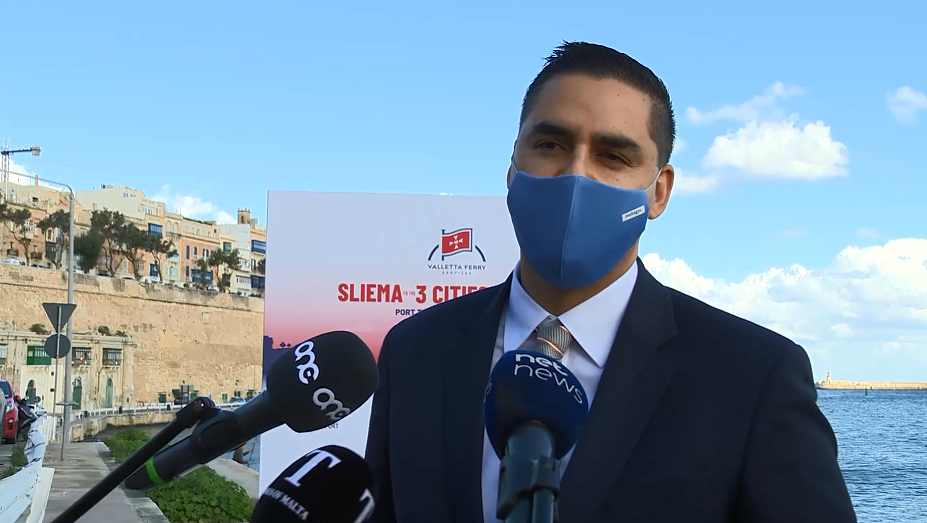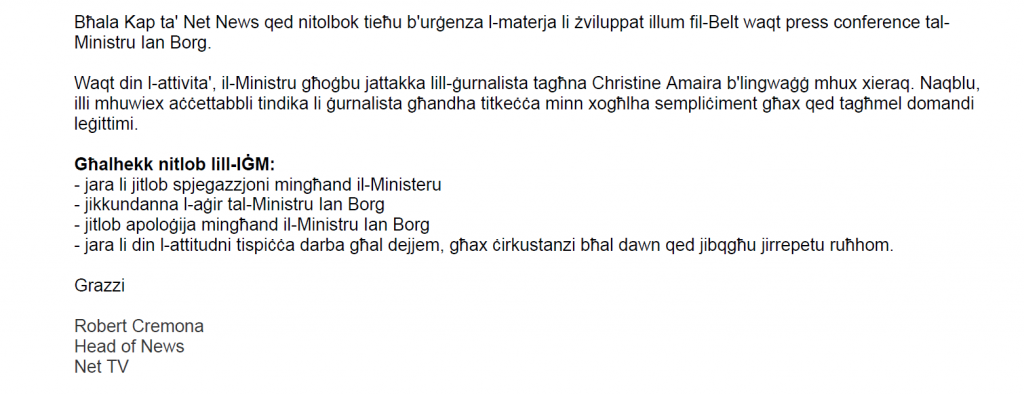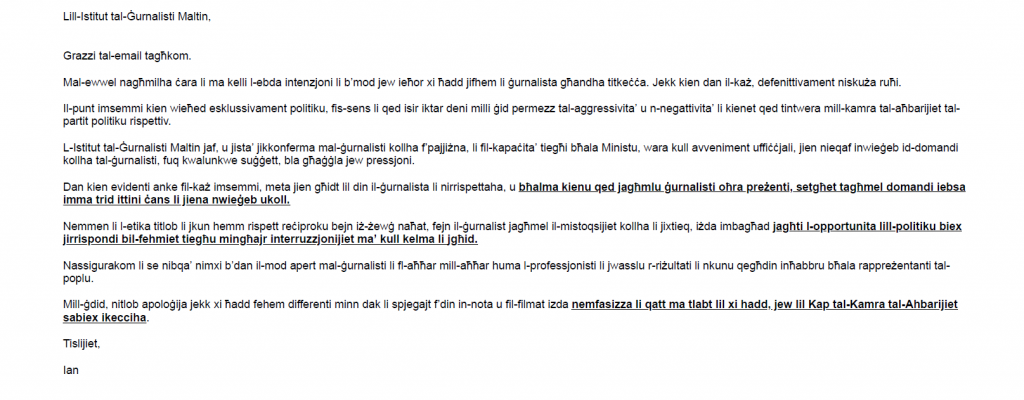
Complaint: Comments by Minister Ian Borg
Reference is made to the complaint levied by the Editor of Net News against the Hon Minister of Transport and Infrastructure Ian Borg.

The complaint was supported by audio-visual material. Essentially, the complaint states that “waqt din l-attivita’, il-Ministru għoġbu jattakka lill-ġurnalista Christine Amaira b’lingwaġġ mhux xieraq. Naqblu, illi mhuwiex aċċettabbli tindika li ġurnalista għandha titkeċċa minn xogħlha sempliċiment għax qed tagħmel domandi leġittimi.” (during this activity, the Minister chose to attack the journalist Christine Amaira using inappropriate language. We agree that it is unacceptable to indicate that a journalist should be fired from her work simply because she was asking legitimate questions)
The complaint procedure was initiated as soon as the complaint was received and the complaint was sent to the Minister for his side of the story.

Link to footage may be found here:
In his reply the minister made the following points:
- He had no intention that his words should be construed to mean that the journalist should be fired and thus apologised;
- The point raised was exclusively political and the ‘aggression and negativity’ shown by the PN media was causing more harm than good;
- As minister he always stops to answer all questions without haste or pressure;
- The journalist could ask any questions she chose to put, as did other journalists, but she needs to give me time to answer;
- Ethics demand that when a politician is asked questions, s/he is given the time to answer without interruption.
Having seen the video supplied, the IGM would like to make the following remarks.
- The video material was cross-checked with similar material from another newsroom. The material tallied and bore out the basis of the complaint. Indeed the minister’s reaction too bore out the veracity of the material supplied.
- While the minister’s apology is noted and appreciated, his disclaimer that he had no intention that his words should be construed to mean that the journalist should be fired rings very hollow since the words were very explicit: “Kieku jiena kap tal-aħbarijiet tal-kamra tiegħek kieku ilni li neħħejtek minn ġurnalista tal-istess kamra.” (Had I been the head of your newsroom, you would have been removed from the newsroom quite some time since). However, the IGM takes it that the minister realised that he had gone too far and wanted to make amends. The IGM hopes that the cavalier attitude adopted in replying to questions will be permanently shelved.
- The issue of accountability raises its head again. Over the past five months, the IGM has had at least three formal occasions where it reminded the political class of the need to answer questions: “It is a journalist’s job to ask questions. This is a fundamental right, also known as Freedom of Expression. It is a politician’s job to answer. It is called transparency and accountability” – https://igm.mt/2020/08/20/ba-persists-on-blaming-journalists-instead-of-rectifying-the-error-of-judgement-made/; “The IĠM notes that it is the role of journalists to ask questions” – https://igm.mt/2020/09/12/it-is-the-role-of-journalists-to-ask-questions-and-the-role-of-pr-officials-to-service-those-questions/; “il-ġurnalist għandu d-dmir jistaqsi l-mistoqsijiet li dwarhom iridu tweġiba ċ-ċittadini Maltin. U l-membri tal-Gvern huma fid-dmir li jwieġbu dwar l-operat tagħhom” – https://igm.mt/2020/10/10/li-l-gurnalisti-ma-kienux-mistiedna-ghall-iffirmar-tal-ftehim-tal-mizieb-huwa-att-anti-demokratiku/ .
Answering questions is a duty. Malta is a democratic country and respect to its electorate is a given. That the question was a political one is neither here nor there since it was made to a politician. Cheap quips and a patronising attitude are serious in that they show a flippancy and arrogance unbecoming to public office. To be clear, this was not a case where the answer was not what the journalist expected. This was an out of point reply intended to avoid answering and belittle the question. This is deserving of the strongest censure.
- The minister’s reply also makes two references to replies: the need to be given time to answer and the need to be given the possibility to answer without interruption. These are very important points.
- The IGM code of Ethics states: Journalists should bear in mind that their role is to inform the public and hold those with power to account. Journalism should not be used to unnecessarily intimidate, harass or persecute people. The International Press Standards Organisation is clear and adamant in this but it also makes a very strong point about the public interest. For example, in Gerry Adams vs the Belfast Telegraph, the complainant’s contention that coverage of his activity, as an elected representative, was disproportionate or sought to undermine him did not raise a breach of the harassment clause was not upheld in the public interest. The Editor’s Code Book indeed says that “There is a public interest in freedom of expression itself”.
- Departing from the point that all questions must be answered, the person questioned must be given the time to answer the questions posed. If the journalist feels that the question is not answered in part or in full, the question may be posed again and perhaps for a third time.
- Questioning techniques should not take on the mantle of debate or heckling. It is not the journalist’s role to become a politician and this seems to be forgotten by journalists of the political media. If a politician, after two, even three attempts, still does not answer, then the public will have had its answer anyway since, avoidance of giving replies is for the politician a slow but steady acid-drip on his or her credibility.
Finally, the IGM re-iterates the need for mutual respect. This respect needs to come out of an understanding that both politicians and journalists are there to give a service to the public and that service will only be best served if both maintain dignity, resect and decorum.
